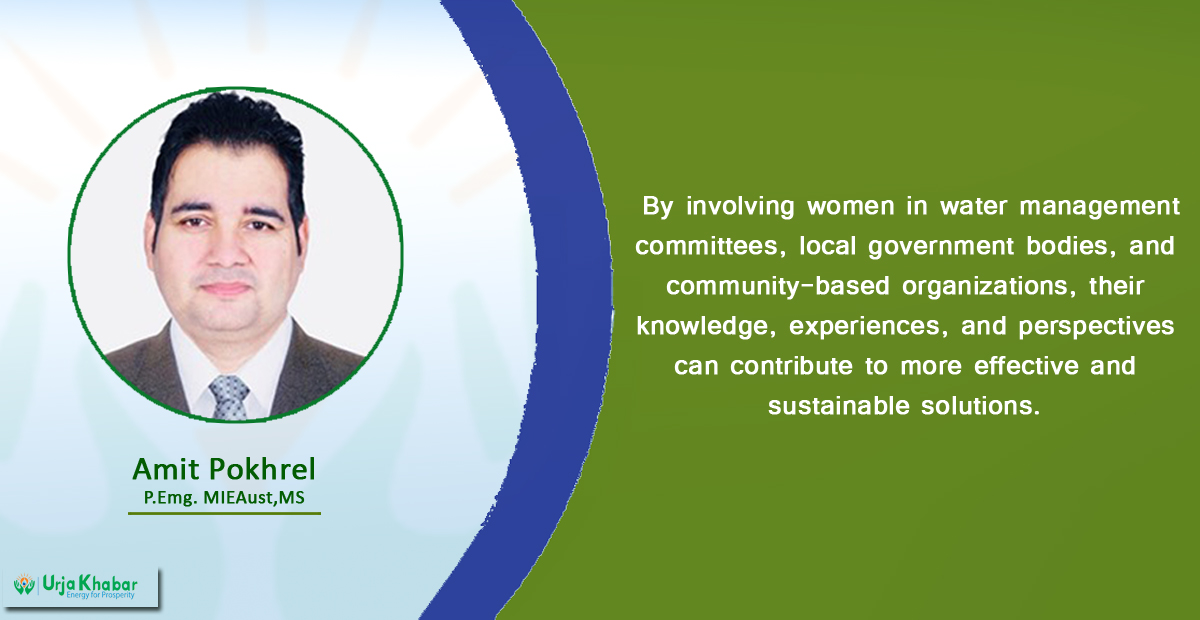
Gender equality and environmental sustainability are two critical aspects that need to be addressed in Nepal's water sector. As one of the countries highly vulnerable to climate change, Nepal faces numerous challenges in managing its water resources sustainably while ensuring equal access and participation for all genders.
This article aims to explore the connections between gender equality and environmental sustainability in Nepal's water sector and discuss potential solutions for a more inclusive and ecologically sound water management system.

The Link between Gender and Water
In many parts of Nepal, women and girls bear the primary responsibility for water collection, spending hours each day fetching water from distant sources. This burdensome task not only hinders their education and economic opportunities but also puts their health and safety at risk. Limited access to clean water directly affects women's empowerment and reinforces gender inequalities.

Traditional gender roles often dictate that men are responsible for decision-making and management in the water sector. This exclusion of women from important roles in water governance and management perpetuates gender-based discrimination and hampers sustainable development efforts.
Environmental Challenges
Nepal is highly vulnerable to the impacts of climate change, such as erratic rainfall patterns, melting glaciers, and increased instances of floods and droughts. These changes directly affect the availability and quality of water resources. Moreover, climate change exacerbates existing gender inequalities, as women are more susceptible to the adverse effects due to their reliance on natural resources for livelihoods.
Industrial pollution, inadequate waste management, and unregulated agricultural practices contribute to water pollution and degradation in Nepal. Contaminated water sources not only threaten public health but also harm aquatic ecosystems and biodiversity. Addressing these environmental issues requires a comprehensive approach that integrates gender perspectives and emphasizes sustainable practices.
Promoting Gender Equality and Environmental Sustainability
Ensuring equal representation and active participation of women in decision-making processes is crucial for promoting gender equality and environmental sustainability. By involving women in water management committees, local government bodies, and community-based organizations, their knowledge, experiences, and perspectives can contribute to more effective and sustainable solutions.
Investing in capacity building and education programs that empower women and enhance their skills and knowledge in water management is vital for fostering gender equality and environmental sustainability. Providing training on sustainable practices, water conservation techniques, and climate change adaptation measures can equip women with the necessary tools to actively engage in water resource management.
Implementing integrated water resource management approaches that prioritize the protection of ecosystems and promote social equity is essential. This includes adopting sustainable water use practices, ensuring equitable access to water resources, and incorporating gender-responsive planning and policymaking. Integrating gender considerations into water-related policies and initiatives can help address the diverse needs and perspectives of all stakeholders.
Gender equality and environmental sustainability are closely interconnected aspects of Nepal's water sector. Achieving these goals requires a comprehensive and inclusive approach that recognizes the significant role of women in water management and addresses environmental challenges effectively. By promoting inclusive participation, investing in capacity building, and adopting integrated water resource management strategies, Nepal can strive towards a more equitable, sustainable, and resilient water sector.
(The Author of this article works as a Senior Contract & Commercial Expert in the Energy Business of Golyan Group, Kathmandu, Nepal)
